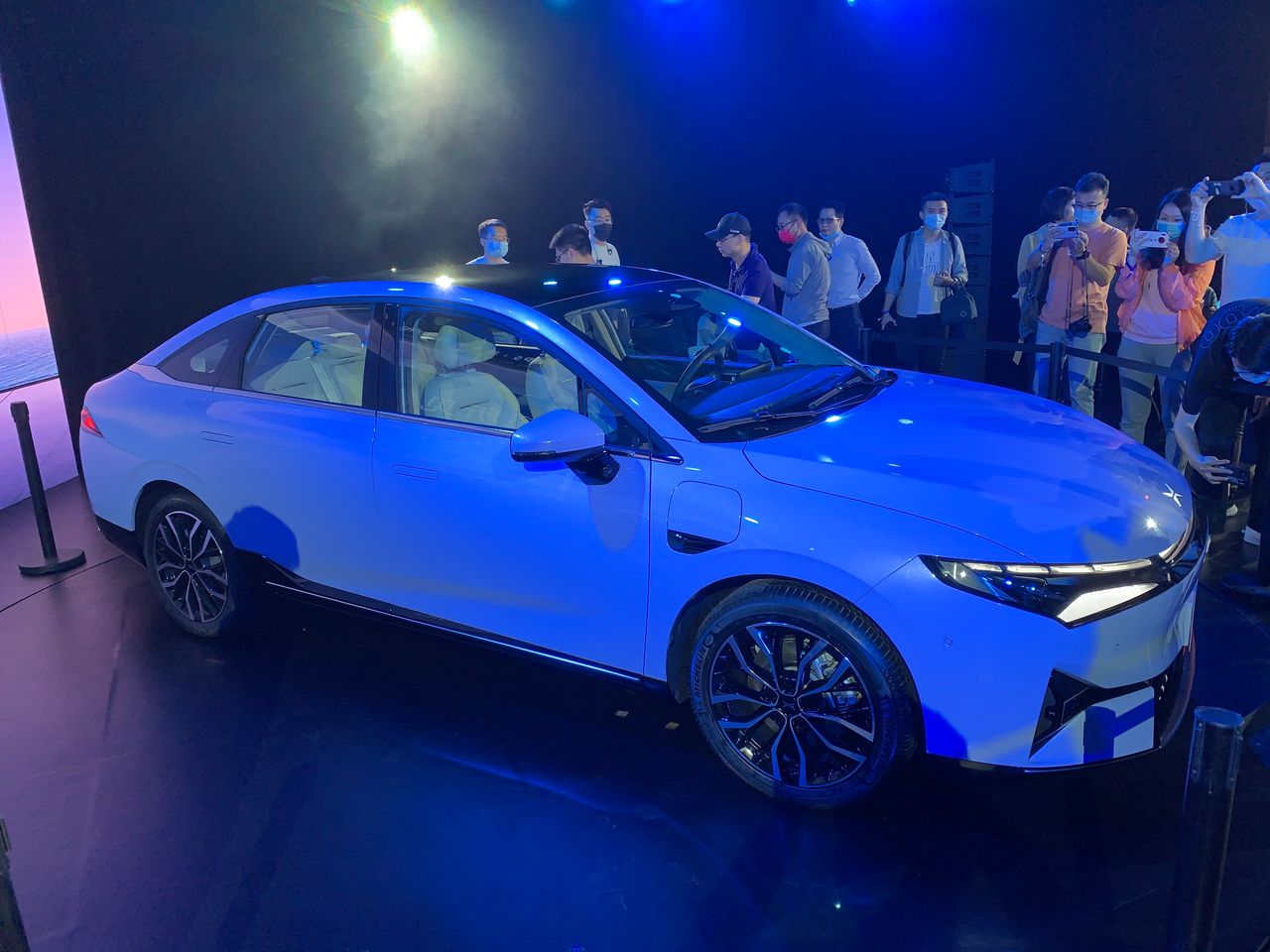Electric-Vehicle Startup XPeng Bets On Tech That Tesla Rejects
One of three U.S.-listed Chinese EV makers, it is relying on innovation to overtake its rivals.
GUANGZHOU—Once a Tesla Inc. fan who owned four of its vehicles, He Xiaopeng, co-founder of Chinese electric-vehicle startup XPeng Inc., now wants to overtake the car company that originally inspired him.
While acknowledging Tesla as an inspiration, Mr. He said XPeng—one of three Chinese EV companies listed in the U.S.—can win using innovation, an area in which Chinese technology companies have become increasingly formidable.
“We have a saying in China,” Mr. He said in an interview Wednesday at XPeng’s headquarters in the southern city of Guangzhou. “To defeat someone, you need to do something different.”
XPeng, alongside its U.S.-listed peers Li Auto Inc. and Nio Inc., has taken investors on a wild ride over the past eight months.
The company’s August listing on the New York Stock Exchange valued it at US$8 billion. By November its value had jumped to nearly $58 billion. Now it is back down to about US$27 billion. In March, the Shanghai-based research firm Hurun Report said Mr. He was worth US$11 billion.
XPeng unveiled its third production vehicle, the P5 sedan, in Guangzhou on Wednesday. Deliveries of the P5, which is said to have approx. 600km driving range, are due to start this year. The company didn’t announce the car’s price, though it will be lower than the in-production P7 sedan, which starts at roughly $60,000 and is a direct competitor of the made-in-China Tesla Model 3, which costs the equivalent of about $66,900.
XPeng began low-volume exports to Europe in December and plans to enter the U.S. market in the future.
Considered by some analysts as the most tech-centric of China’s EV players, Xpeng deploys a voice-operated user interface in its cars, and an autonomous-driving system for use on stretches of highway with 5G internet coverage.
It recently tested the software by sending a fleet of its cars on a 3540km trip from Guangzhou to Beijing, and logging 0.71 human-operator interventions per 100 km—a new benchmark for self-driving cars, the company claimed. On the roughly 320km Shanghai to Nanjing leg attended by the Journal, the car’s human operator intervened once, swerving when the car failed to notice a bus changing lanes ahead.
XPeng claims its autonomous-driving systems, which have previously used radar and cameras, will be significantly enhanced by the addition of lidar, which uses lasers to scan the vehicle’s surroundings—and which Tesla Chief Executive Officer Elon Musk has dismissed as a waste of money. Xpeng says the new P5 is the first Chinese EV that comes with lidar as standard.
XPeng sold 13,340 vehicles in the first quarter of 2021 and likely needs to sell as many cars every month to break even, said Tu Le, founder of Sino Auto Insights, a consulting firm. Mr. He said in the interview that he was focused on building revenue and growing XPeng’s reputation, rather than on profit.
Tesla sold 69,280 vehicles in China in the January-to-March period, according to the China Passenger Car Association, while Nio sold 20,060 cars.
XPeng is in a strong position as a car company whose main asset is its software, Mr. Le said. “The post-1990s generation in China are all digital natives, and they like Chinese brands,” he said. “What XPeng is doing plays very well with that young Chinese consumer.”
At a moment of rising nationalism in China, homegrown brands have generally been gaining ground on Western ones among local consumers, from clothing to cars.
Mr. He this month announced plans for a third XPeng plant in Wuhan; its second plant, in Guangzhou, is still being built. The three plants will give the company an expected production capacity of 300,000 cars a year.
XPeng last year unveiled a prototype flying car that Mr. He said was far from being a gimmick and potentially key to the company’s future. The company’s growing fleet of EVs is just a starting point for a company with ambitions to define “the future commute,” he said.
Originally a computer programmer, the 43-year-old Mr. He, who comes from the central city of Huangshi, founded UCWeb Inc., a mobile-browser developer, in 2004. He sold the company to Alibaba Group Holding Ltd. a decade later in what was then China’s biggest internet merger, and worked as a senior Alibaba executive until 2017 before leaving to run XPeng, which he had co-founded as an investor in 2014.
The birth of his son in early 2017 jolted Mr. He into starting something new, he said. He settled on EVs despite having no automotive background and, by his own admission, regarding the overheated EV sector as “a crazy business.”
“I wanted my son to think that he had a cool dad,” he said.
Unable to persuade Alibaba to let him develop an EV in-house, Mr. He joined XPeng as full-time chief executive and brought the e-commerce giant on board as an investor. Alibaba owns 12.5% of the company, while Mr. He holds 22.7%. Alibaba didn’t immediately respond to a request for comment.
Mr. He said he only fully realized the difficulty of teaming software engineers with car mechanics when the company produced its first working prototype in late 2017.
The XPeng team was moved to tears when the vehicle rolled out: Engineers wept with joy because the machine worked, while the software developers were heartbroken because to them the unpainted and incomplete test-model “looked like trash,” Mr. He said.
The experience taught Mr. He and his software colleagues that developing a competitive car would be an arduous, years-long process.
Mr. He said his priority was to build XPeng into a global company rather than to outflank Tesla or other competitors, but there is open enmity between Mr. He and the company that once inspired him.
In 2019, Tesla filed a lawsuit against a former employee who had quit Tesla to join XPeng, alleging that he had downloaded its Autopilot source code with a view to handing it over to his new employer. XPeng was never a party to the legal case and said it is “confident we have engaged in no wrongdoing.”
In November, Mr. Musk trashed XPeng’s autonomous-driving system, saying on Twitter that “they have an old version of our software” and alleging that intellectual-property theft “was just an XPeng problem. Other companies in China have not done this.”
Mr. He fired back on Weibo. “It seems XPeng’s next-generation autonomous driving architecture…has made someone in the West feel very upset,” he said.
“Elon Musk is an amazing person and a great entrepreneur, despite some flaws,” Mr. He said in the Wednesday interview. Tesla didn’t respond to a request for comment.
Reprinted by permission of The Wall Street Journal, Copyright 2021 Dow Jones & Company. Inc. All Rights Reserved Worldwide. Original date of publication: April 15, 2021.
 Copyright 2020, Dow Jones & Company, Inc. All Rights Reserved Worldwide. LEARN MORE
Copyright 2020, Dow Jones & Company, Inc. All Rights Reserved Worldwide. LEARN MORE
This stylish family home combines a classic palette and finishes with a flexible floorplan
Just 55 minutes from Sydney, make this your creative getaway located in the majestic Hawkesbury region.
The remote northern island wants more visitors: ‘It’s the rumbling before the herd is coming,’ one hotel manager says
As European hot spots become overcrowded , travellers are digging deeper to find those less-populated but still brag-worthy locations. Greenland, moving up the list, is bracing for its new popularity.
Aria Varasteh has been to 69 countries, including almost all of Europe. He now wants to visit more remote places and avoid spots swarmed by tourists—starting with Greenland.
“I want a taste of something different,” said the 34-year-old founder of a consulting firm serving clients in the Washington, D.C., area.
He originally planned to go to Nuuk, the island’s capital, this fall via out-of-the-way connections, given there wasn’t a nonstop flight from the U.S. But this month United Airlines announced a nonstop, four-hour flight from Newark Liberty International Airport in New Jersey to Nuuk. The route, beginning next summer, is a first for a U.S. airline, according to Greenland tourism officials.
It marks a significant milestone in the territory’s push for more international visitors. Airlines ran flights with a combined 55,000 seats to Greenland from April to August of this year, says Jens Lauridsen, chief executive officer of Greenland Airports. That figure will nearly double next year in the same period, he says, to about 105,000 seats.
The possible coming surge of travellers also presents a challenge for a vast island of 56,000 people as nearby destinations from Iceland to Spain grapple with the consequences of over tourism.
Greenlandic officials say they have watched closely and made deliberate efforts to slowly scale up their plans for visitors. An investment north of $700 million will yield three new airports, the first of which will open next month in Nuuk.
“It’s the rumbling before the herd is coming,” says Mads Mitchell, general manager of Hotel Nordbo, a 67-room property in Nuuk. The owner of his property is considering adding 50 more rooms to meet demand in the coming years.
Mitchell has recently met with travel agents from Brooklyn, N.Y., South Korea and China. He says he welcomes new tourists, but fears tourism will grow too quickly.
“Like in Barcelona, you get tired of tourists, because it’s too much and it pushes out the locals, that is my concern,” he says. “So it’s finding this balance of like showing the love for Greenland and showing the amazing possibilities, but not getting too much too fast.”
Greenland’s buildup
Greenland is an autonomous territory of Denmark more than three times the size of Texas. Tourists travel by boat or small aircraft when venturing to different regions—virtually no roads connect towns or settlements.
Greenland decided to invest in airport infrastructure in 2018 as part of an effort to expand tourism and its role in the economy, which is largely dependent on fishing and subsidies from Denmark. In the coming years, airports in Ilulissat and Qaqortoq, areas known for their scenic fjords, will open.
One narrow-body flight, like what United plans, will generate $200,000 in spending, including hotels, tours and other purchases, Lauridsen says. He calls it a “very significant economic impact.”
In 2023, foreign tourism brought a total of over $270 million to Greenland’s economy, according to Visit Greenland, the tourism and marketing arm owned by the government. Expedition cruises visit the territory, as well as adventure tours.
United will fly twice weekly to Nuuk on its 737 MAX 8, which will seat 166 passengers, starting in June .
“We look for new destinations, we look for hot destinations and destinations, most importantly, we can make money in,” Andrew Nocella , United’s chief commercial officer, said in the company’s earnings call earlier in October.
On the runway
Greenland has looked to nearby Iceland to learn from its experiences with tourism, says Air Greenland Group CEO Jacob Nitter Sørensen. Tiny Iceland still has about seven times the population of its western neighbour.
Nuuk’s new airport will become the new trans-Atlantic hub for Air Greenland, the national carrier. It flies to 14 airports and 46 heliports across the territory.
“Of course, there are discussions about avoiding mass tourism. But right now, I think there is a natural limit in terms of the receiving capacity,” Nitter says.
Air Greenland doesn’t fly nonstop from the U.S. because there isn’t currently enough space to accommodate all travellers in hotels, Nitter says. Air Greenland is building a new hotel in Ilulissat to increase capacity when the airport opens.
Nuuk has just over 550 hotel rooms, according to government documents. A tourism analysis published by Visit Greenland predicts there could be a shortage in rooms beginning in 2027. Most U.S. visitors will stay four to 10 nights, according to traveler sentiment data from Visit Greenland.
As travel picks up, visitors should expect more changes. Officials expect to pass new legislation that would further regulate tourism in time for the 2025 season. Rules on zoning would give local communities the power to limit tourism when needed, says Naaja H. Nathanielsen, minister for business, trade, raw materials, justice and gender equality.
Areas in a so-called red zone would ban tour operators. In northern Greenland, traditional hunting takes place at certain times of year and requires silence, which doesn’t work with cruise ships coming in, Nathanielsen says.
Part of the proposal would require tour operators to be locally based to ensure they pay taxes in Greenland and so that tourists receive local knowledge of the culture. Nathanielsen also plans to introduce a proposal to govern cruise tourism to ensure more travelers stay and eat locally, rather than just walk around for a few hours and grab a cup of coffee, she says.
Public sentiment has remained in favour of tourism as visitor arrivals have increased, Nathanielsen says.
—Roshan Fernandez contributed to this article.
This stylish family home combines a classic palette and finishes with a flexible floorplan
Just 55 minutes from Sydney, make this your creative getaway located in the majestic Hawkesbury region.






















